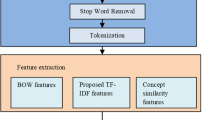Abstract
In today’s digital world, there is an enormous and exponential growth in the amount of knowledge available online. When seeking precise and pertinent information, it is very difficult for users to find exactly what they are looking for. In this paper, we propose an extractive text summarization approach that utilizes fuzzy logic to determine the relevance and importance of sentences in a multi-document such as legal documents, news articles, business articles, etc. The presented multi-document summarization approach aims to achieve good content coverage and high data richness with less redundancy. The fuzzy logic model is utilized to present a new features approach to deal with inaccurate and unpredictable featured value. Additionally, our proposed work eliminates redundant data through cosine similarity and threshold values. Our proposed approach is evaluated based on DUC2006 dataset using ROUGE evaluation metrics, and the results demonstrate its effectiveness in generating informative and quality summary. The performance of the proposed approach is compared with the existing fuzzy logic-based multi-document summarization (MDS) method and deep learning-based approach for text summarization (DLbTS). The experimental results show that our proposed approach outperforms in comparison of MDS and DLbTS by 8.30%, 3.84%, and 5.98% in terms of \(ROUGE_1\) score under precision, recall, and F-score, respectively.







Similar content being viewed by others
Data availability
It is standard dataset and taken from NIST organization. URL: https://www-nlpir.nist.gov/projects/duc/guidelines.html.
References
Gambhir M, Gupta V (2017) Recent automatic text summarization techniques: a survey. Artif Intell Rev 47:1–66
Yadav AK, Ranvijay R, Yadav RS, Maurya AK (2023) State-of-the-art approach to extractive text summarization: a comprehensive review. Multimedia Tools Appl 1–63
El-Kassas WS, Salama CR, Rafea AA, Mohamed HK (2021) Automatic text summarization: a comprehensive survey. Expert Syst Appl 165:113679
Sharaff A, Jain M, Modugula G (2022) Feature based cluster ranking approach for single document summarization. Int J Inf Technol 14(4):2057–2065
Alomari A, Idris N, Sabri AQM, Alsmadi I (2022) Deep reinforcement and transfer learning for abstractive text summarization: a review. Comput Speech Language 71:101276
AL-Khassawneh YA, Hanandeh ES (2023) Extractive Arabic text summarization-graph-based approach. Electronics 12(2):437
Srivastava AK, Pandey D, Agarwal A (2021) Extractive multi-document text summarization using dolphin swarm optimization approach. Multimedia Tools Appl 80:11273–11290
Mutlu B, Sezer EA, Akcayol MA (2019) Multi-document extractive text summarization: A comparative assessment on features. Knowl-Based Syst 183:104848
Alguliev RM, Aliguliyev RM, Hajirahimova MS, Mehdiyev CA (2011) Mcmr: maximum coverage and minimum redundant text summarization model. Expert Syst Appl 38(12):14514–14522
Venkatachalam S, Subbiah LP, Rajendiran R, Venkatachalam N (2020) An ontology-based information extraction and summarization of multiple news articles. Int J Inf Technol 12(2):547–557
Yadav AK, Maurya AK, Yadav RS et al (2021) Extractive text summarization using recent approaches: a survey. Ingénierie des Systèmes d’Information 26(1)
Du Y, Huo H (2020) News text summarization based on multi-feature and fuzzy logic. IEEE Access 8:140261–140272
Patel D, Shah S, Chhinkaniwala H (2019) Fuzzy logic based multi document summarization with improved sentence scoring and redundancy removal technique. Expert Syst Appl 134:167–177
Suanmali L, Salim N, Binwahlan MS (2009) Fuzzy logic based method for improving text summarization, ar**v preprint ar**v:0906.4690
Binwahlan MS, Salim N, Suanmali L (2010) Fuzzy swarm diversity hybrid model for text summarization. Inform Process Manag 46(5):571–588
Kyoomarsi F, Khosravi H, Eslami E, Davoudi M (2010) Extraction-based text summarization using fuzzy analysis. Iran J Fuzzy Syst 7(3):15–32
Patel D, Chhinkaniwala H (2018) Fuzzy logic-based single document summarisation with improved sentence scoring technique. Int J Knowledge Eng Data Mining 5(1–2):125–138
Abbasi-ghalehtaki R, Khotanlou H, Esmaeilpour M (2016) Fuzzy evolutionary cellular learning automata model for text summarization. Swarm Evol Comput 30:11–26
Jafari M, Wang J, Qin Y, Gheisari M, Shahabi AS, Tao X (2016) Automatic text summarization using fuzzy inference, In: 2016 22nd International Conference on Automation and Computing (ICAC), IEEE, pp. 256–260
Rezaei A, Dami S, Daneshjoo P (2019) Multi-document extractive text summarization via deep learning approach, In: 2019 5th Conference on Knowledge Based Engineering and Innovation (KBEI), IEEE, pp. 680–685
Goularte FB, Nassar SM, Fileto R, Saggion H (2019) A text summarization method based on fuzzy rules and applicable to automated assessment. Expert Syst Appl 115:264–275
Ali Z, Ali J (2020) Zhang lining, Zeeshan, Niaz Muhammad. automatic text summarization for Urdu roman language by using fuzzy logic. J Autonomous Intell 3(2):23–30
Elbarougy R, Behery G, El Khatib A (2020) Extractive Arabic text summarization using modified Pagerank algorithm. Egyptian Inform J 21(2):73–81
Yadav AK, Singh A, Dhiman M, Kaundal R, Verma A, Yadav D (2022) Extractive text summarization using deep learning approach. Int J Inf Technol 14(5):2407–2415
Mahalleh ER, Gharehchopogh FS (2022) An automatic text summarization based on valuable sentences selection. Int J Inf Technol 14(6):2963–2969
Tomer M, Kumar M, Hashmi A, Sharma B, Tomer U (2023) Enhancing metaheuristic based extractive text summarization with fuzzy logic. Neural Comput Appl 1–13
Banerjee S, Mukherjee S, Bandyopadhyay S (2023) A novel centroid based sentence classification approach for extractive summarization of covid-19 news reports. Int J Inform Technol 1–13
Meena YK, Gopalani D (2015) Evolutionary algorithms for extractive automatic text summarization. Proc Comput Sci 48:244–249
Srivastava AK, Pandey D, Agarwal A (2022) Redundancy and coverage aware enriched dragonfly-fl single document summarization. Lang Resour Eval 56(4):1195–1227
Mandal S, Singh GK, Pal A (2021) Single document text summarization technique using optimal combination of cuckoo search algorithm, sentence scoring and sentiment score. Int J Inf Technol 13:1805–1813
Author information
Authors and Affiliations
Corresponding author
Ethics declarations
Conflict of interest
Authors declare that they have no conflict of interest.
Informed Consent
There is no plagiarized.
Rights and permissions
Springer Nature or its licensor (e.g. a society or other partner) holds exclusive rights to this article under a publishing agreement with the author(s) or other rightsholder(s); author self-archiving of the accepted manuscript version of this article is solely governed by the terms of such publishing agreement and applicable law.
About this article
Cite this article
Yadav, A.K., Ranvijay, R., Yadav, R.S. et al. Large text document summarization based on an enhanced fuzzy logic approach. Int. j. inf. tecnol. (2023). https://doi.org/10.1007/s41870-023-01563-6
Received:
Accepted:
Published:
DOI: https://doi.org/10.1007/s41870-023-01563-6




